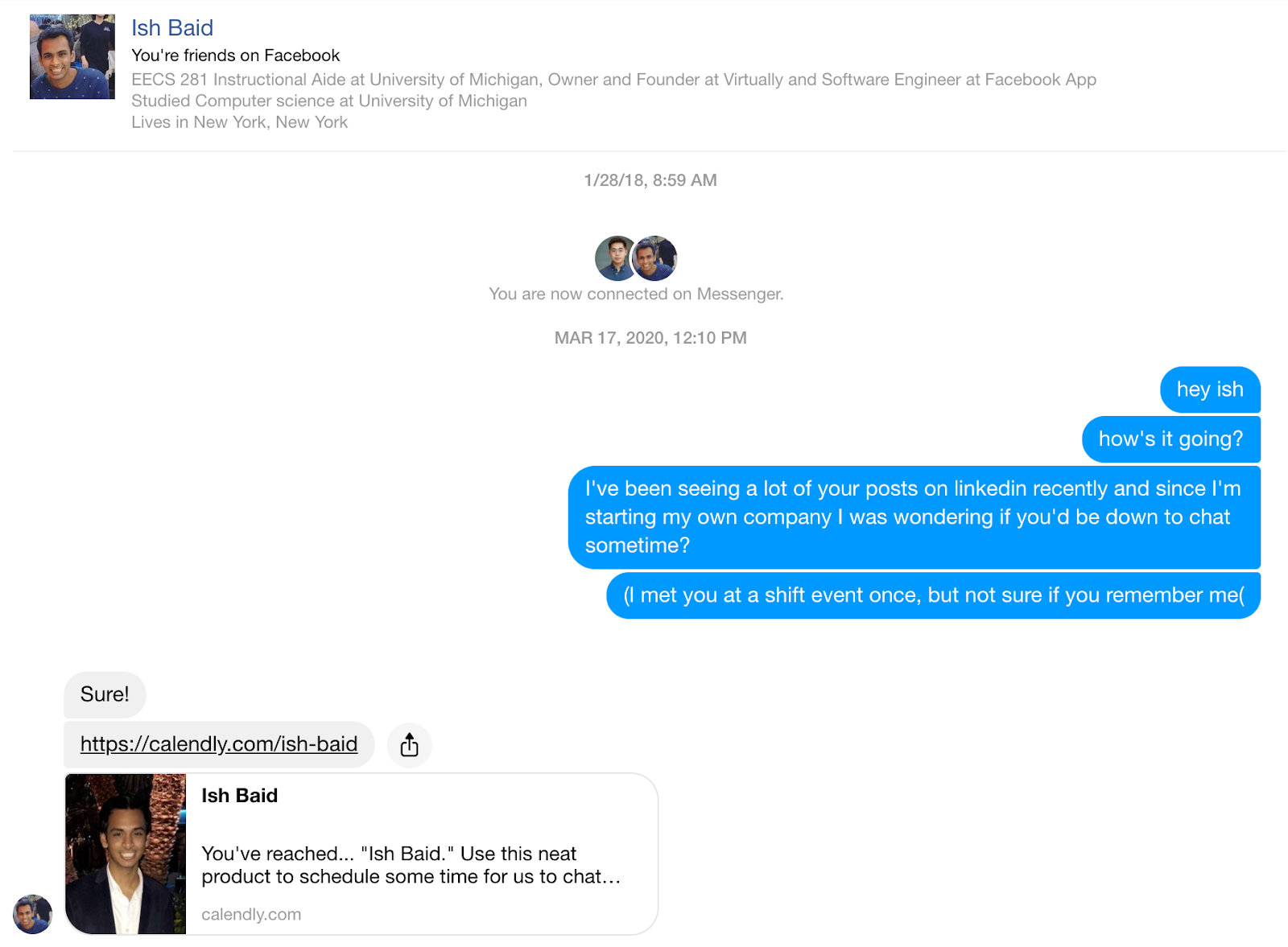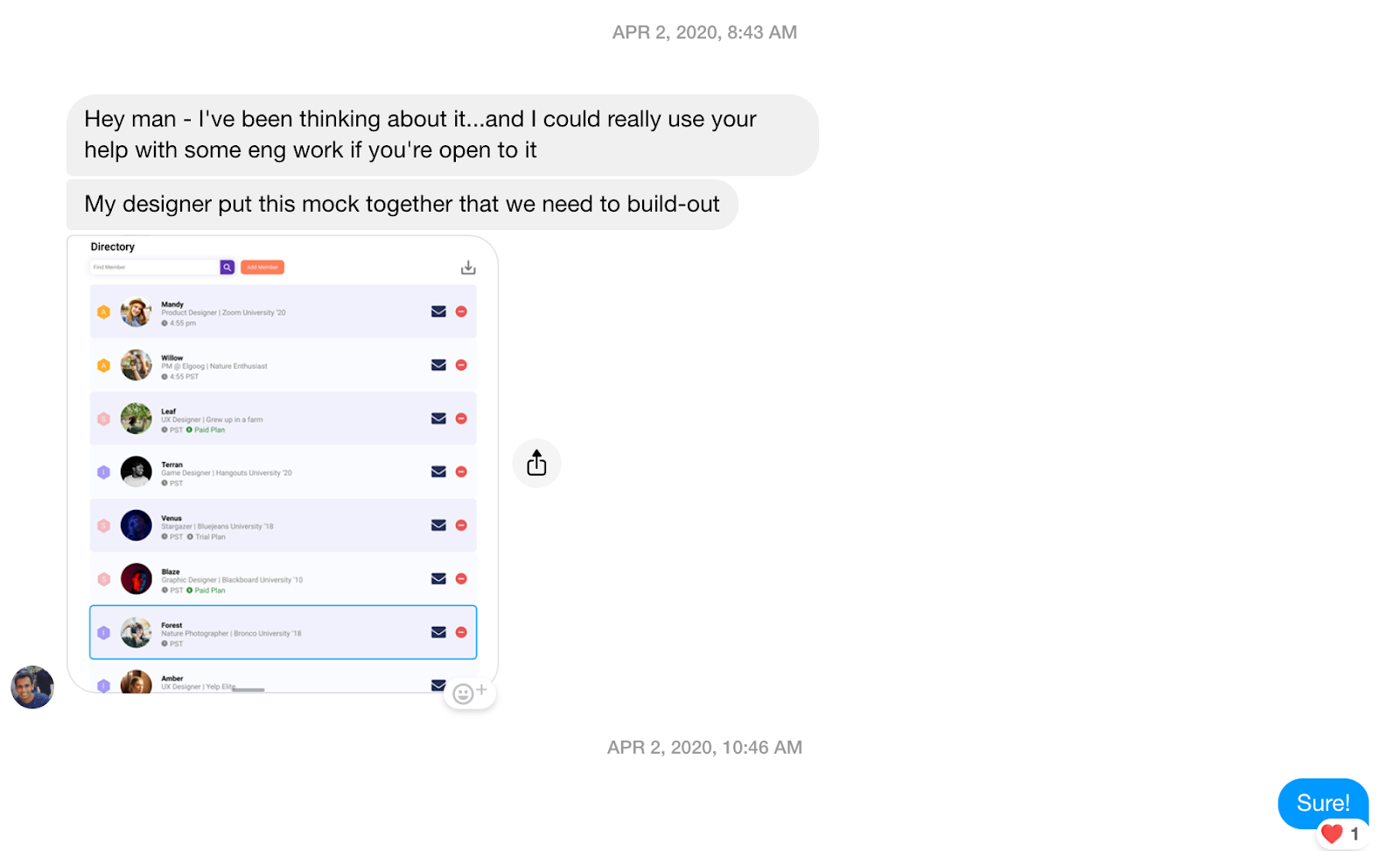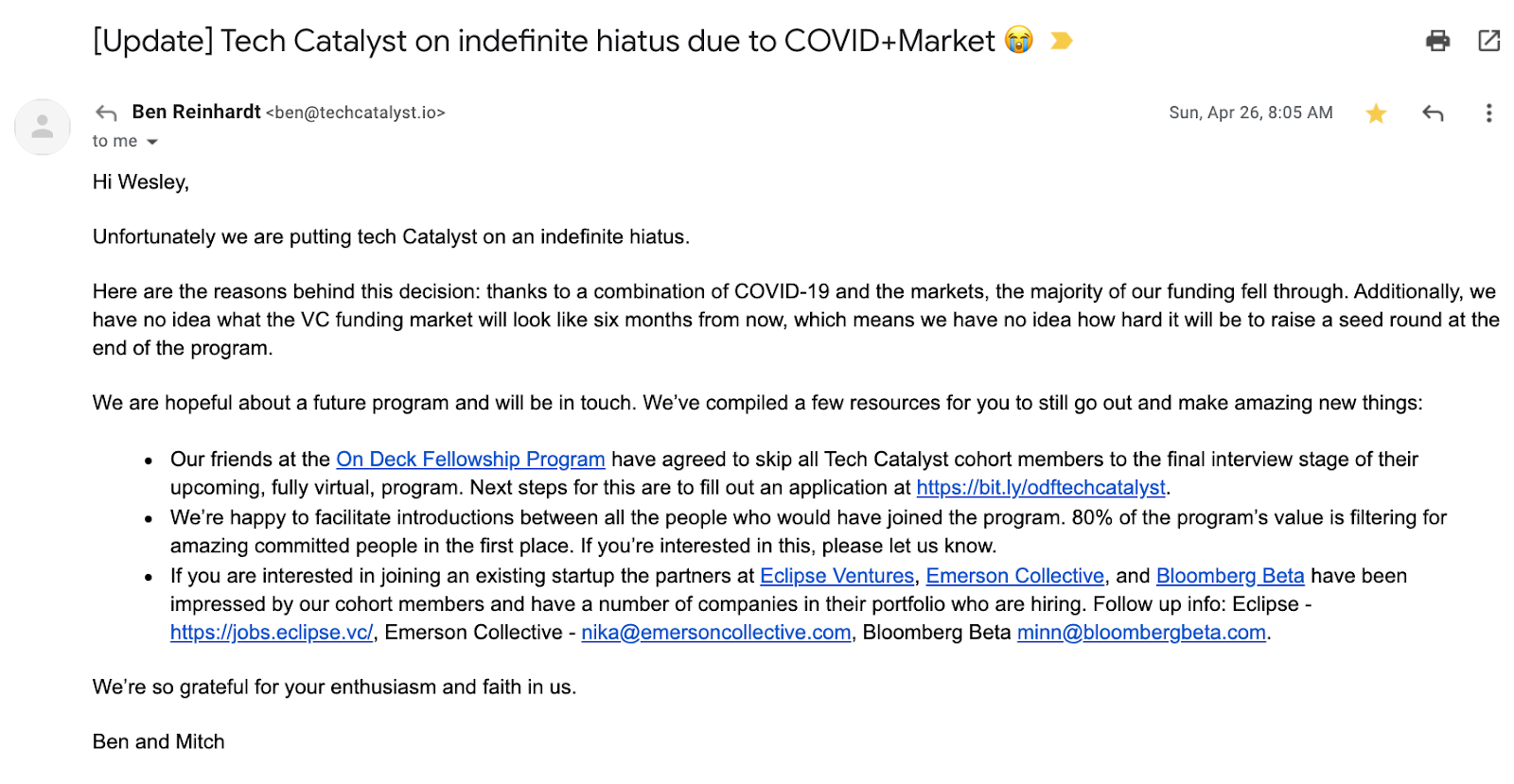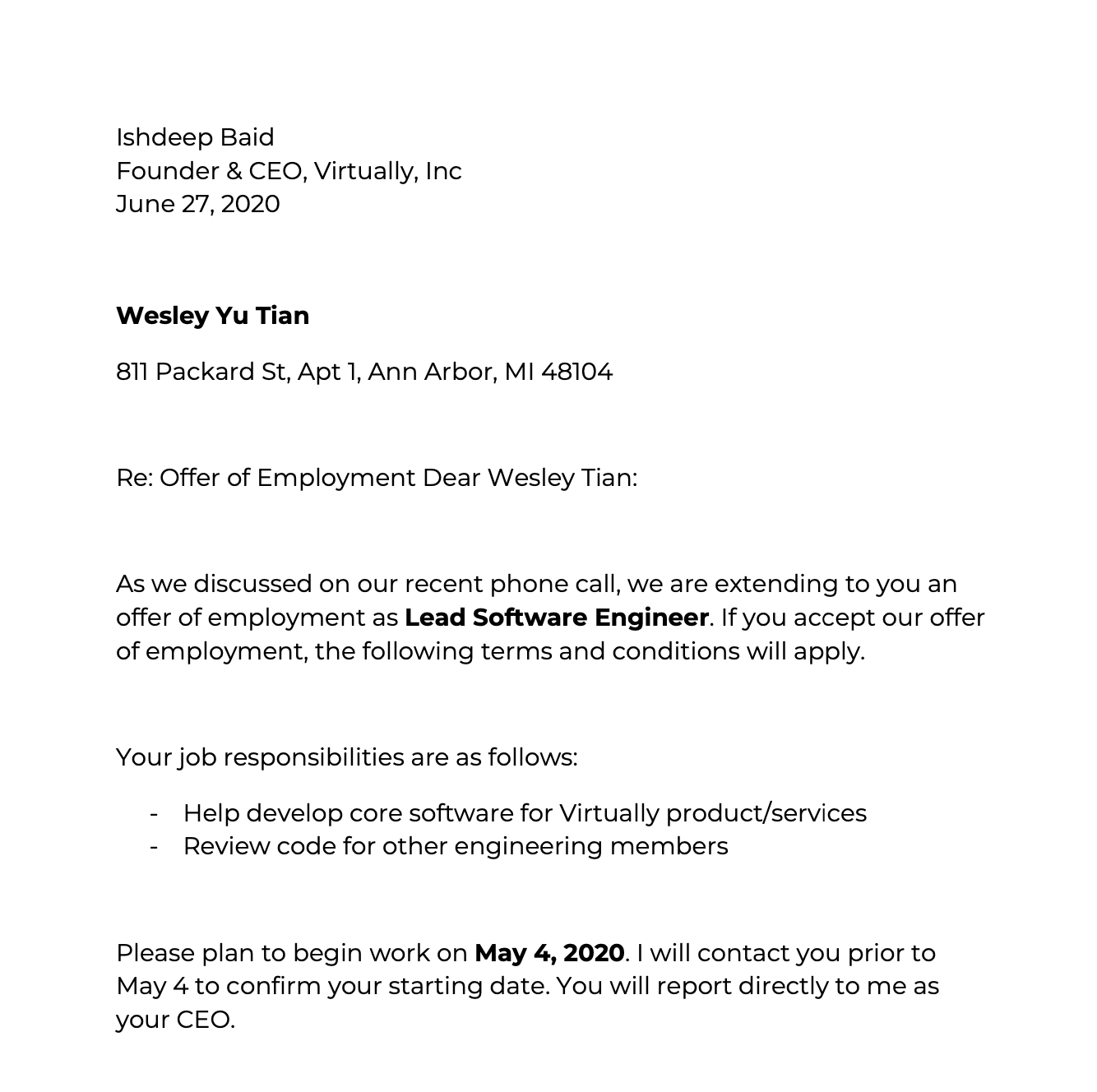How I Found My Dream Job and 3 Tips On How You Can, Too
November 27th, 2020
Last summer, in my most popular and inspirational blog post yet, I wrote about how believing in myself, dreaming big, and following my plans led me from nearly failing high school to landing offers at Big Tech. Near the end of that post, I stated that my next goal was to find my "dream job."
I suspected I had found this "dream" job a few months after working at Virtually. Now that my 6-month work anniversary at Virtually has just passed, I can say with certainty that I've found it—for now. Things move quickly at startups.
In this post, I tell the story of how I became the first employee and engineer at Virtually and what you can take away from my experience to find your dream job, too. If you've already found your dream job, I feel your content and hopefully more people can find theirs!
1. Figure out your ideal work environment
To be both successful and happy, find the kind of work environment you enjoy and thrive in. Do you want the structure of a large organization or the autonomy of a smaller one? Are you more motivated, and do you perform better at a small org or a big one? You can maximize your chances of finding what works for you by exploring the different kinds of companies out there and then honing in on ones that you've felt happier and more successful at.
I've interned at four companies of varying sizes during college, from a two-person startup to a 160,000 employee behemoth. Interning at these places made me realize that I perform better under pressure when I can see my direct impact and understand the big picture–AKA, the business side of things. I also enjoy having more value, responsibility, and autonomy over my work. The smaller the company, the more these attributes can be maximized. I also wanted a tighter-knit team and more mission-driven and determined co-workers. Thus, after a short break after graduating college in December 2019, in March of 2020, I began to apply to early-stage startups. (My initial plan was to study business, policy, and tech at Stanford and look for co-founders, but they rejected me. I'm honestly glad the way things turned out as I would’ve received way less value from attending Zoom university.)
Note: If you're familiar with reinforcement learning concepts, what I'm vouching for is a dumbed-down solution to the multi-armed bandit problem where you want to explore more in the beginning, and exploit more once you've explored more opportunities. In machine learning, it's known as the exploration vs. exploitation tradeoff.
2. Do what you love
If you pursue what you love, you'll stumble upon more opportunities in that area. This intuitively makes sense as, for example, if you love writing, you'll seek other good writers and talk to other writers. And the more people you know in writing, the higher the chance of a writing opportunity coming your way. However, if you decide to pursue investment banking instead, you'll discover more opportunities in investment banking.
As a human in the 21st century, we need money. And because the only work that I was doing was being an unpaid researcher, I had to make some money to pay the bills.
So, I decided to start a business from an idea spurred by a conversation with one of my housemates, Tarun. It would be a stock market for student sports tickets (see StockX). The more and more I worked on building out the web app, the more I realized how much I enjoyed the work. It was rewarding to see the visual progress I was making on the front end and the back end's functional progress. I enjoyed being able to create something that was mine and talk to people about it. Though I didn't have customers yet, my idea was further validated when one of my labmates told me how difficult and time-consuming it was to sell Michigan football tickets and that he would buy and sell more tickets if my idea was realized.
Soon after the project started ramping up, and I was able to convince a few people to help out, I quit my job at the research lab to work on this full-time. I also began applying for funding around this time. I would be living the dream if I could do what I loved and at the same time get paid for it. Fortunately for me, after a few interviews with TechCatalyst (founded by Ben Reinhardt and Mitch Adler), they agreed to provide around 100K in pre-seed funding upon successful completion of the first 3 months of their startup program and the opportunity to use their network (such as On Deck) to raise a seed round at the end of month 6.
Thus I began pursuing what I loved doing.
3. Reach out to people authentically
One of the biggest reasons why I feel like I've been able to discover great opportunities is because I've never been afraid to talk to and meet people. I'll invite people I've never met before to coffee or try and meet up with people in real life after meeting them on Twitter. The key here is to form authentic connections. Form connections with people to learn about them, not to get something from them. If you can help them or if they can help you, great. But, the key is to make authentic connections. Asking people for advice is essential as well, but usually, you'll have to appeal to them in some way to be successful at doing that. If you ask a billionaire to lunch, he'll probably say no. But if you started a company which is valued at 100M, there's a much higher chance he'll say yes.
Unsure whether I was ready to pursue my startup dream through TechCatalyst or not, I decided to reach out to Ish Baid, a University of Michigan alum, who I often saw posting on LinkedIn. I had learned that Ish had been working on Virtually by himself for over a year at that point. So, I decided to reach out to him and ask about his journey. Perhaps I could learn something useful.

Though it was through a Zoom call, that was the first time that I technically met Ish. *I asked Ish a question once at a Facebook recruiting event (he was recruiting for Facebook) at one of my clubs.
We had a great conversation, so we scheduled another call. Two more Zoom calls later, I casually asked if there was anything I could do to help Ish. To my surprise, he got back to me a few days later and offered to pay me $40/hr to help him build out a directory page for his company, Virtually.

I wasn’t expecting such a formal job, but he insisted on paying me. This was a godsend as not only did it provide me money to sustain myself until my startup program began in May, but it was also an opportunity to learn more about the experience of building a company from scratch.
On top of working for Virtually about 10-15 hours a week, working on my own company, and shorting the stock market as the COVID-19 fallout began to unfold around the world, I suddenly became pretty busy.
Soon, the reverberations of COVID-19 arrived in the US, and the markets began to react violently. A week later, I got an email from Ben Reinhardt, one of the co-founders of TechCatalyst (now defunct), telling me that my funding had been pulled and that their program would be halted indefinitely. Apparently, the source of their funds was somehow tied to the markets.

The next day, on April 27th, the logical step for me was to ask Ish if I could work for him full-time. I hadn't planned to ever work there full-time, but the more I thought about it, the more I realized how great an opportunity this could be. Though I wouldn't be a founder on paper, it was de-risked in many ways. The platform had customers, Virtually had significant pre-seed funding, and Ish's determination, having accomplished all of this himself, was appealing to me. Plus, it was in an area that I was already passionate about for some time: government 2.0 startups, which are profitable startups that attempt to solve problems that governments are typically tasked to solve, like education. Ish told me he'd consider my request.
A few days later, he sent me an offer to work for him full-time!

The first month was technically a trial period since there was a bit of risk (for both parties). Still, I knew that if I could prove my worth, I'd be able to build some equity and trust with Ish/the company. A few days later, we were accepted into Y Combinator, which validated my belief in Ish and the business even more. It was a moderate risk, but I believed if we worked hard, the reward would be immense, both in impact and financially. Plus, I knew it was my ideal work environment for success and happiness.
I worked hard and was able to receive an amount of equity I was happy with. Since then, and a few 85-hour, but mostly 65-hour weeks later*, we've gotten many more paying customers–including Avion, the Lambda School for the Philippines, and Elon Musk's school. Additionally, we raised a 1.8M seed round, hired 4 full-time employees, and went from having a single-page app to a full-fledged product that solves real problems. It has been a rollercoaster ride for sure.
In conclusion, by figuring out what environment I loved working in the most, pursuing what I loved (building ideas from scratch), and reaching out to people, I was able to land my dream job, one that fits my personality and my aspirations. Plus, it's an environment that I seem to be thriving in. Next up, I’ll be posting an article that will go into much more detail about why I decided to look to join an early-stage startup instead of Big Tech.
* At the time of initially writing this, we had recently finished YC's accelerator program. Now that we took advantage of the leverage we had to raise a seed round and hired a few people to help divy up the labor, I work a more sustainable 40-50 hrs/wk.